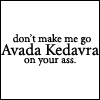Poll
Why haven't you contributed an example of someone saying "I love you" to the Love and Semantics thread?
Huh?
I've already done that. Quit bugging me.
I can't remember a single such scene. In fact I can't remember anything I read or watch. Too much substance abuse. Sorry.
Sounds like too much work. I'd have find the thread and type some stuff and I don't know what. Could easily take three minutes.
I just got this from the Haters Group. Enough already!
OMG. Way too embarrassing.
Poll added by: Manny
Comments Showing 1-8 of 8 (8 new)
date newest »
newest »
 newest »
newest »
 Very happy to provide numerous examples of love in all its manifestations if it's more you need. Can you restate the question?
Very happy to provide numerous examples of love in all its manifestations if it's more you need. Can you restate the question?
 Thank you Paul! Here are the instructions, which you'll also find at the start of the thread:
Thank you Paul! Here are the instructions, which you'll also find at the start of the thread:People often claim to be confused about what love is, or what the words "I love you" mean. But are they genuinely confused, or are they just complaining that we often lie when we say these words? Beth Ann and I work in linguistics, and we have been thinking for a while that it would be interesting to try and investigate this question objectively. In real life, you never know what people are really thinking, but in literature you are often given more insight, due to the author's privileged position. On GoodReads, we can usually find many people who have read the same book, and we can compare how they experienced it.
If you'd like to take part in this project, please start by contributing one or more interesting examples from books and films of people saying "I love you". (When we say "book", we mean any form of literature, particularly including movies and song lyrics). It can be some slight variant, e.g. "I think I love you"; we are also interested in cases where someone doesn't say "I love you", though the context suggests that they were thinking of doing so, or that it would be reasonable to expect them to do so. We are very interested in examples from other languages. Yukie gave us some fascinating data from Japanese.
Later, for each example, we'd like the people in the group who know the relevant book independently to write down what they think the character who said "I love you" meant. When we reach this stage, we will suggest some specific things to think about when people write their reports. Finally, we will all compare our answers. We primarily want to discover a) to what extent different readers agree on what they think the characters meant in each specific context, b) to what extent we think different characters mean the same thing in different contexts. So, in other words, when a specific character says "I love you" in a specific book, do we readers all think they mean the same thing? And if we compare scenes from different books, do we think characters mean different things by "I love you"?
We want a wide range of examples - there are no "right" or "wrong" ones, just pick things you personally find interesting. Though it will help if the books/films are sufficiently well-known that at least one other person has read them, otherwise it will be harder to compare.
 I think I have contributed on several occasions and, although looking forward to further discussion on said comments, was somewhat dismayed to note that I had stopped the conversation in its tracks. Recently I used a Shakespeare quote which I thought quite lovely, but alas, not a whisper from it. I am forced to deduce that my comments are meeting with great disdain or at least discontent.
I think I have contributed on several occasions and, although looking forward to further discussion on said comments, was somewhat dismayed to note that I had stopped the conversation in its tracks. Recently I used a Shakespeare quote which I thought quite lovely, but alas, not a whisper from it. I am forced to deduce that my comments are meeting with great disdain or at least discontent.
 I'm sorry Rhonda, no one is disdaining you! The thread, alas, is so far a very utilitarian one, mainly about collecting examples for further discussion. You're clearly eager to get to the discussion part (I am too) but we aren't quite there yet. Beth Ann and I think we need a minimum of 50 examples, right now we are just south of 30.
I'm sorry Rhonda, no one is disdaining you! The thread, alas, is so far a very utilitarian one, mainly about collecting examples for further discussion. You're clearly eager to get to the discussion part (I am too) but we aren't quite there yet. Beth Ann and I think we need a minimum of 50 examples, right now we are just south of 30.
























We have about 25 examples, and thank you very much for your contribution! But Beth Ann says we need more, and she's usually right about experimental methodology...